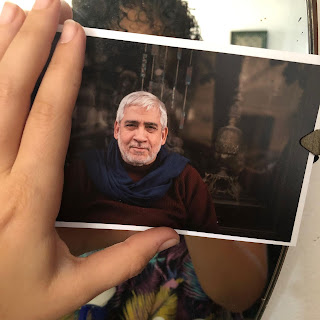A City of One's Own
A City of One’s Own
Kyria Lysoon… Kyria
Lysoon…Kyria Lysoon
The man’s chanting is drowned by
the pulling of the brakes and the screech of the train slowing down on its
tracks. He does not get on. The station at the heart of the city is never
empty; there is a never ending exchange of travelers getting on and off under
the cold florescent light.
Kyria Lysoon, he chants
again.
I do not move. I miss the train as
I look at this man who seemed to have been there just for me. No one else would
understand. For them, he is just another man driven mad by his city.
Giza, 1999
By the dim light peeking
through the tree branches and pouring through the window, I am arranging my
grandmother’s photographs of faces which have become so familiar to me. The
faces are all worn out, smiling; carrying something heavier than their features
could carry. They could be called ‘authentic Egyptian faces.’ Even the children
seem to have their years and wrinkles outlined for them.
My grandmother’s photography was a
window to a Cairo I would never have known on my own: a Cairo whose edges I
have not reached till now. The faces of Dahshur, Mansuriya, Kerdasa, Gold
Island, Manyal, Dokki, Giza, Old Cairo became my friends.
The faces of my grandmother’s
friends, of my cousins and me, of the places where we sat and ate éclairs as
she drank her coffee, never made it to the pile of photographs stacked on the
table waiting for her grandchildren to arrange them and place them correctly: a
summer job for the little ones.
Cairo University, 2010
Other Literatures in English:
Waguih Ghali’s Beer in the Snooker Club is being discussed. Ram, Ghali’s
protagonist, an elite Copt who has no money, living in Egypt post ’52, argues
that the true Egyptian is not just the fellah, or the man who rides the tram. A
true Egyptian is one who has a sense of humor.
Throughout the novel, there is in
Ram a desperate need to claim Cairo for himself, to have a share in her
heirloom, right next to the cucumber seller. Humor is his only proof of
belonging.
In my grandmother’s photographs and
in others sold next to hers, Ram’s face as I imagine it does not appear.
Tahrir Station, 2011
Kyria Lysoon, the man
cried. I remember Ram and how Kyria Lysoon was the only thing he said in
Coptic.
If only the man had been there,
praying, when people were being arrested, pulled off of trains for looking
uneducated, for being dressed in a way that does not agree with Police and
Military social standards. They might’ve been saved by this man’s plea.
“God have mercy. Kyria
Lysoon. Ya Rab Ir’ham.”
And yet I know that had he been
there, no one would’ve understood. Unless they were Copts or read Ghali, they
wouldn’t understand. God’s mercy would’ve passed those under the ground. It
would’ve over looked those whose faces have been worn out by the streets of
Cairo.
“There is…no God but God… No
God but a God… No God, No God.”*
You can never have Cairo to
yourself. You surrender to the city instead of trying to make her your own. In
the late hours of the night, in the early hours of the morning, she is not
yours.
Even if you have her for a moment,
there will be no one there to see her giving in to you.
She refuses heirs. And yet
when Cairo needs a face, when she is to be photographed, those whose skin has
been rubbed raw by her cruelty are first to pose.
The man sitting on the coffee shop,
the paper seller, the shoe shiner, the boys and girls selling flowers and
packets of tissue paper, the girl whose eyes are my first memory of vegetables,
carrying a cabbage on her head: Cairo’s faces. Reluctantly, Cairo is seen
through them. Yet she is not theirs.
Ram and I do not have the right
features.
Cairo, 2012
For a moment the streets are his.
His boyish face, stenciled onto a white sheet, huge, held by ten others,
cradles the sky above him. Cairo has surrendered. To him, today she has let go
and given him her streets and her people.
There is no humor coming from the
people’s chants and yet there is no mistake. These are Egyptians. They inhabit
her city.
There is no God but God
A coffin passes. And even
though he is not in it, Cairo has given her streets to him today.
After 16 years of running around
her corners, Cairo is Gika’s today.
There is no God but God. The
Shaheed is His beloved.
For a moment, for that fleeting
moment of mourning, Gika is Cairo’s beloved today.
November 26th, 2012
*Ghali, Waghuih. Beer in the Snooker Club. New Amsterdam Books, USA: 1999
"A City of One's Own" was written for and published in Dutch translation in Cairopolis: a project by Jan Beke. It was published in Beljium in 2013 by SNOECK publications.
About Cairopolis the book
http://www.alartemag.be/en/en-art/cairopolis-cairo-through-four-different-lenses/
"A City of One's Own" was written for and published in Dutch translation in Cairopolis: a project by Jan Beke. It was published in Beljium in 2013 by SNOECK publications.
About Cairopolis the book
http://www.alartemag.be/en/en-art/cairopolis-cairo-through-four-different-lenses/

تعليقات